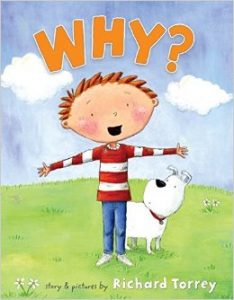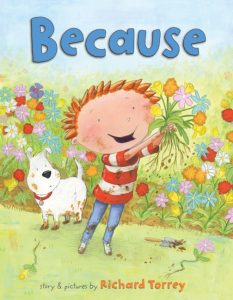Helping kids ask questions will give them an advantage. Thomas Berger said, “The art and science of asking questions is the source of all knowledge.”

Despite the astonishing number of questions kids ask a day–some estimates are more than 300–asking questions is really quite complicated. Brains have to organize the correct order of words, change the voice from regular speaking to go up at the end, and use specific words. Could it be that kids use the word Why because it works for asking a question so easily? Besides why, there’s how, when, what, and where to add to the list. It’s quite a challenge to learn and remember which word to use when and where.

Our example is part of the learning process and gives kids a model to copy. We can also use books and stories with questions to give them more examples, like Richard Torrey’s fun book “Why?” The pages have tricky questions, such as “Why do feet stink?” or “Why do crackers have holes?” You can follow the Why? book with another one by the same author, “Because.”

Asking the question is only part of the package. Besides the wondering, kids have to be able to trust that we will answer their quesion. They are not only asking for information, there is another underlying question, that is, “Am I important enough to answer?” Whether or not our answer makes sense to the child, our reply means “Yes, you are important enough.

Another way to say having an advantage is the expression to ‘steal a march.’ Since it’s the month of March, using this expression is a fun play-on-words. Helping kids ask questions is another piece of early learning and development. It gives them a critical tool they can use to explore and understand the world as well as contributing to their sense of worth. For a play-of-the-day, have some fun with questions, not just serious ones, but the sillier the better. Do you have any questions?
